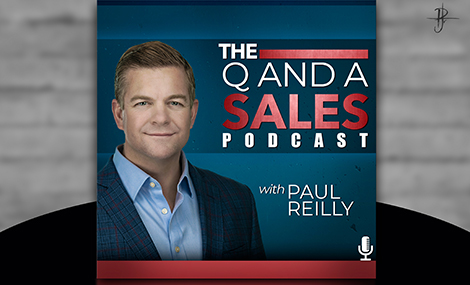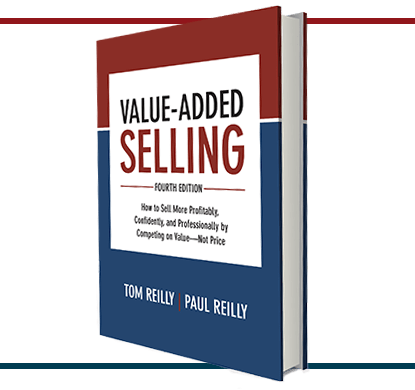Paul provides some guidance on the many facets and layers of handling customer complaints.
Show Notes
Customer service is better equipped to handle certain types of customer complaints. But the severity of the issue could require sales rep involvement.
Who has the expertise to solve the problem the right way: customer service, technical, maintenance, sales team, leadership, etc.?
Keep the customer informed of the steps being taken to address their issue. They want to know you’re on it.
Put a team together and conduct a failure analysis. Then fix the root cause of the problem for this customer and all the other customers experiencing the issue.
Did you enjoy the podcast? Go to Apple Podcasts to rate/review the podcast: https://podcasts.apple.com/us/podcast/the-q-and-a-sales-podcast/id1485103513. Click “Listen” then the “ratings and reviews” button.
Visit www.ToughTimer.com to get started on the 30-Day Tough-Timer Challenge!
Order your copy of Selling Through Tough Times from Amazon or Barnes & Noble!
Click here to purchase the latest edition of Value-Added Selling!
Interested in our public seminar offerings? Click here to learn more.
***
Thank you for tuning in. Our show is updated weekly with the questions you ask. So, please go to the home page to ask the question that you want answered.
Thank you to our production team at The Creative Impostor Studios.
Be sure to follow our show in your favorite podcast app and share this episode with a colleague or friend.
And most importantly…make it a big day.
Who should handle customer complaints?
(Transcribed from podcast)
On today’s episode, we are going to the website. We had a question come in just over the weekend from Yolanda, and she wants to know who should handle customer complaints. Should salespeople? Should customer service? Maybe tech people? It really just depends. We’re going to dive deep into that question because it is a good question. Oftentimes we think, “Okay, salespeople, you just need to go out and sell. Customer service, your role is just to make sure you’re serving customers.” And we’ll talk about what factors go into this decision in just a little bit. But just a reminder, make sure you visit TheQandASalesPodcast.com. When you are there, you can ask me a question just like Yolanda did. And by the way, Yolanda, thank you for the question.
Now, before we get into answering that question, make sure you pick up your copy of Value-Added Selling. You know, in Value-Added Selling we talk about being customer focused and what that entails and some of the basic principles, whether you’re in sales or service, will apply to your profession. So Value-Added Selling is available. Wherever you get your books you can find Value-Added Selling.
Also pick up your copy of Selling Through Tough Times. In this book, we highlight some of the steps you can go through to better partner with your customers. In fact, we have an entire chapter dedicated to partnering more effectively with customers, and you can strengthen that bond and build that relationship. And that’s something sales and service are both part of. So make sure you pick up your copy.
So let’s get back to that question for Yolanda: “Should sales or service handle customer complaints?” There are several determining factors. I don’t think there is a yes/no type of response to this question. So I’ll give you a few things to think about, Yolanda.
Number one: think about the severity of the issue. Now, if you have a minor customer complaint, that is, I don’t know, something simple like, “Oh, I’m having trouble reading your invoices. Can you guys work on the language of the invoice or be more specific?” Or “Could you rewrite the PO this way?” Some of the little issues, absolutely, customer service should take care of it. And the reason why, number one—service is better equipped to handle those responses quicker. They’re either at their desk, at home, wherever, they’re in front of the computer, waiting to take customer calls so they can solve these issues. So, the severity of the issue is going to matter.
Now let’s say we miss a shipment and the customer has to shut down their production line because of this issue. Sales will need to handle this. And the reason why, salespeople usually have that strong bond; they are the face of the company to the customer. So when things go (inaudible), when it is a terrible situation, I would bring in the sales team. Bring in the sales team because they typically own the relationship, they built a stronger bond with the customer, they’re the ones who made the promise to the customer, so they need to be involved. Now that doesn’t mean we don’t work together as a team. But before deciding, “Okay, who should handle which type of complaint,” consider the severity.
The second consideration when deciding who should handle the complaint—consider the complexity of the problem or the issue at hand. The more complex the situation, you need to bring sales in. And again, the reason why—they’re the face of the company. They’re typically managing multiple layers of relationships within an organization so they can get in there, navigate, help explain what’s going on. Again, if it’s really not that complex, if it’s a simple issue, a simple fix, a simple problem, then yes, customer service. Again, they’re better equipped to handle those. So again, think of severity, think of complexity.
And number three—think about expertise. Who has the knowledgeable expertise to solve the problem the right way. Now, this means, okay, beyond just sales, beyond service. We may look at an issue and say, “Okay, we need our technical department to come in here and help explain what’s going on,” or “We need our maintenance team to come in here and explain what’s going on.” You may need the leadership of your company to come in and meet with a customer to explain what’s going on. So, depending on who has the most expertise, consider inviting them into the process.
You may also want to consider who is making the complaint. Well, you know it’s going to be a customer, right, but which member of that company? If we’re talking about a technical engineer that is calling into your company because they have a complaint, you’re better off matching their expertise with your technical engineers. We call this matching up level adjacent relationships because, a technical engineer wants to talk to another technical engineer. Accounts payable wants to talk to someone in accounting. So, consider who is best equipped to handle this complaint. So those are three things to consider.
Now, some basic principles to keep in mind when we’re thinking about customer issues, customer complaints. Remember, customers don’t always care who solves the problem, they just care that the problem is solved. Now, one thing I do see, Yolanda, when we’re talking to sales audiences, salespeople for some reason, believe they are the only ones who can solve a problem. And what they’re doing is they’re really limiting their ability to go out there and sell because they feel as though they are the only ones who can solve the issue, solve the problem. They don’t incorporate their team. And that’s a mistake because the customer ends up suffering. Again, customers don’t care who takes care of it, they just care that it gets taken care of.
Next, urgency is going to be important. It’s not enough to urgently solve a problem. We must demonstrate urgency. Now there’s a big difference there. So here’s an example. Let’s say a customer complains, and they call in or they email, whatever it may be. And we tell that customer, “Yes, we’re going to get on this right away.” Then you hang up the phone. You start to work on the issue. Maybe you’re waiting on a response from someone else within your company. All this time is ticking by and the customer doesn’t sense that you are urgently responding. So we need to demonstrate urgency by explaining to the customer what we’re going to do and provide them with updates. So keep that in mind.
Another thing to keep in mind—transparency is critical. We need to be open and honest with our customers as to what happened, what’s going on and how we’re going to fix the issue. Honesty and transparency are critical. That’s how we build trust. When you’re building trust with a customer, and building that bond, it’s not when things are going great that you’re really building that bond; it’s when things go wrong. That’s when you have the opportunity to prove your honesty and you’re being transparent. So when things are going wrong, be open and honest. Share the progress—how you’re working through the issue. And remember, customers don’t care who takes care of it, they just care that it gets taken care of. So, keep that in mind.
One final thought as we wrap up this episode, when things do go wrong and customers do have a complaint—. I once read a McKinsey study that said only one out of 33 customers actually complain. One out of 33. So that means for every complaint that you hear, there’s a chance that 33 other customers experienced the same issue and they just didn’t tell you about it. So that means we must take complaints seriously. When customers complain, put a team together; conduct a failure analysis. A failure analysis is basically getting the team together and asking, “Why did this happen?” Follow the issue down to its root cause, and you focus on fixing that root cause. So if there’s an error in shipping, if there is a technical failure, if it’s a product failure, whatever it may be, get the departments that are involved in the process together in a room, discuss the complaint, go through the entire experience, even reverse-engineer the customer experience until you get to the root of what happened. And once you do, fix the issue. Because you’re not only fixing it for that customer, but for the 33 other customers that could experience it.
Yolanda, I hope that answers your question. Thank you again for visiting the website.
Make it a big day.


